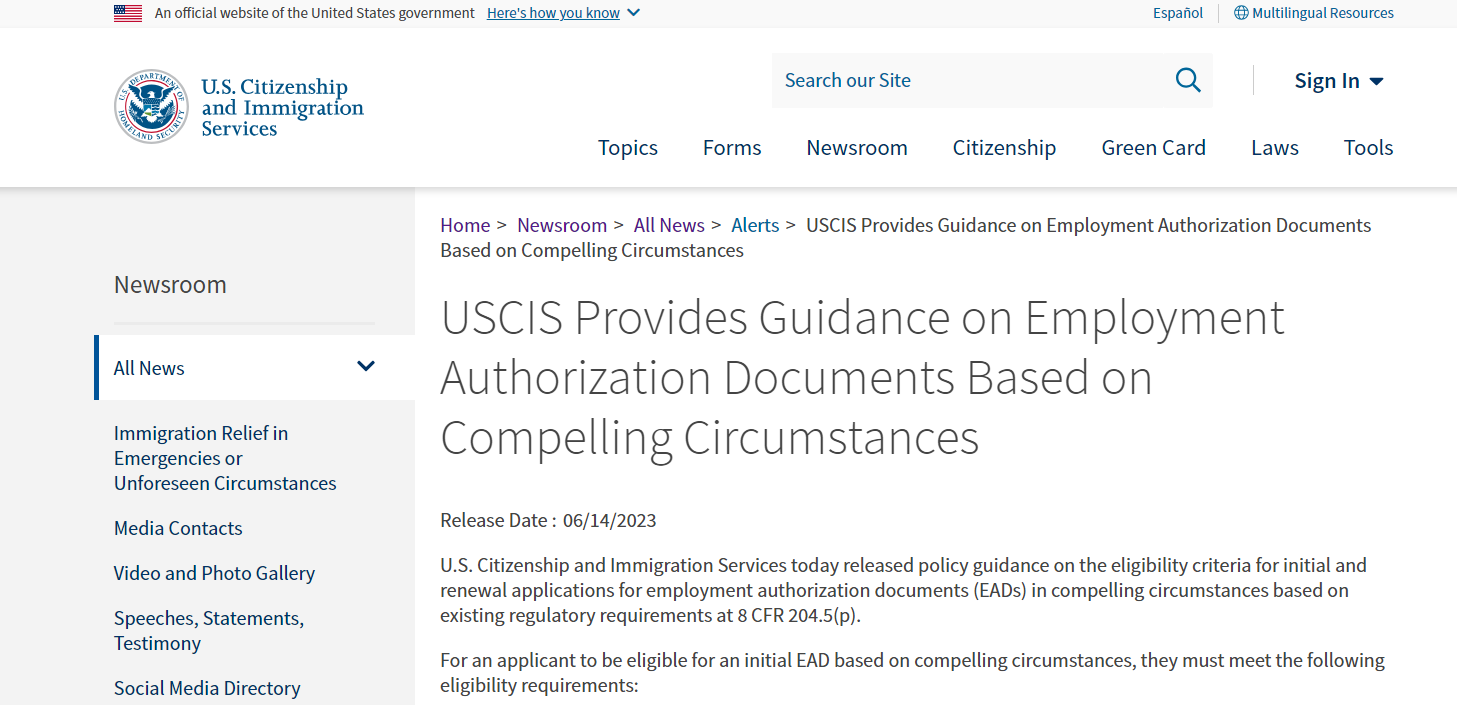The U.S. Citizenship and Immigration Services (USCIS) recently released policy guidance regarding eligibility criteria for initial and renewal applications for Employment Authorization Documents (EADs) based on compelling circumstances. This new guidance aims to provide clarity and guidance to individuals who may qualify for an EAD under specific circumstances.
Let's delve into the key points outlined by USCIS and understand how it impacts certain applicants.
Background
Obtaining employment authorization is crucial for noncitizens in the United States to work lawfully. The authorization is dependent on their immigration status and individual circumstances. While some noncitizens automatically receive employment authorization based on their status or circumstances, others need to apply for it, and USCIS has the discretion to grant it.
USCIS has introduced a provision for employment authorization based on compelling circumstances to address challenging situations faced by beneficiaries of approved employment-based immigrant visa petitions. This temporary measure aims to help individuals who may otherwise have to abruptly stop working and leave the country while on the path to lawful permanent residence.
The agency has released guidance on EADs based on compelling circumstances, outlining the eligibility criteria and the adjudicatory process for reviewing and issuing such EADs. The guidance, found in Volume 10 of the Policy Manual, is effective immediately and applies to applications filed on or after June 14, 2023. It supersedes any prior related guidance.

Preview of the news release
Eligibility Requirements for Initial EADs Based on Compelling Circumstances
To be eligible for an initial EAD based on compelling circumstances, applicants must meet the following criteria:
Approved Immigrant Petition: The principal applicant should be the principal beneficiary of an approved Form I-140, Immigrant Petition for Alien Workers, in the 1st, 2nd, or 3rd employment-based preference category.
Valid Nonimmigrant Status: The principal applicant must be in valid E-3, H-1B, H-1B1, O-1, or L-1 nonimmigrant status or authorized grace period when filing Form I-765, Application for Employment Authorization.
No Adjustment of Status Application: The principal applicant should not have filed an adjustment of status application.
Unavailability of Immigrant Visa: An immigrant visa must not be available to the principal applicant based on their priority date, as per the U.S. Department of State's Visa Bulletin in effect during the Form I-765 filing.
Biometrics and Background Check: The applicant and their dependents must provide the necessary biometrics as required and should not have any felony convictions or two or more misdemeanors.
Demonstrating Compelling Circumstances: USCIS, at its discretion, must determine that the principal applicant demonstrates compelling circumstances justifying the issuance of employment authorization.
Compelling Circumstances and Supporting Evidence
The USCIS guidance provides a non-exhaustive list of situations that may constitute compelling circumstances, including:
- Serious illness or disability
- Employer dispute or retaliation
- Substantial harm to the applicant
- Significant disruption to the employer
Applicants can provide evidence to support their claim of compelling circumstances. For example, individuals with approved immigrant visa petitions in oversubscribed visa categories or chargeability areas, who have resided in the United States for a significant period, may submit evidence such as school or higher education enrolment records, mortgage records, or long-term lease agreements. Such evidence can help demonstrate the potential consequences of their situation, such as the need to sell their home at a loss, withdraw their children from school, or relocate to their home country due to job loss.
Summing Up
The USCIS guidance on EADs based on compelling circumstances offers a clearer framework for individuals seeking employment authorization under specific situations. By establishing eligibility requirements and providing examples of compelling circumstances, the USCIS aims to ensure a fair and consistent evaluation process. Applicants who meet the criteria should carefully review the guidance and gather the necessary evidence to support their case.
For more detailed information, please refer to the USCIS policy alert.

.gif)

.png)
.png)











